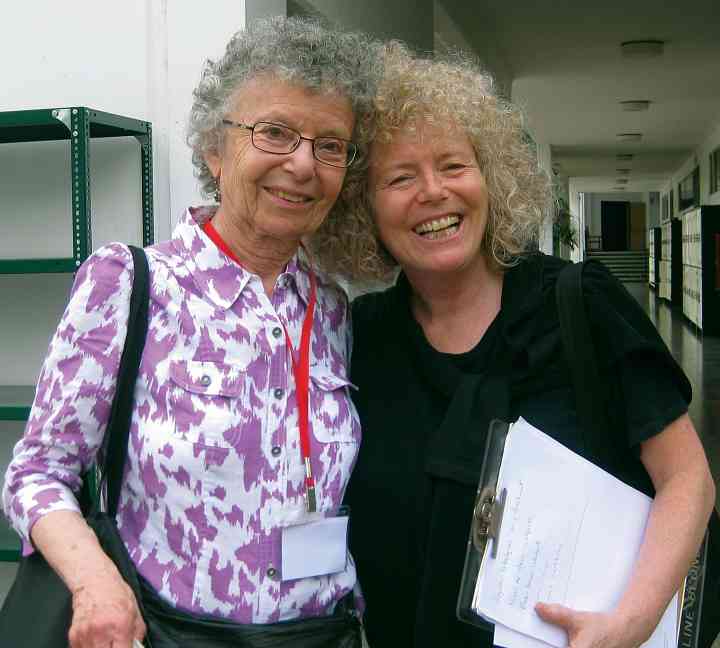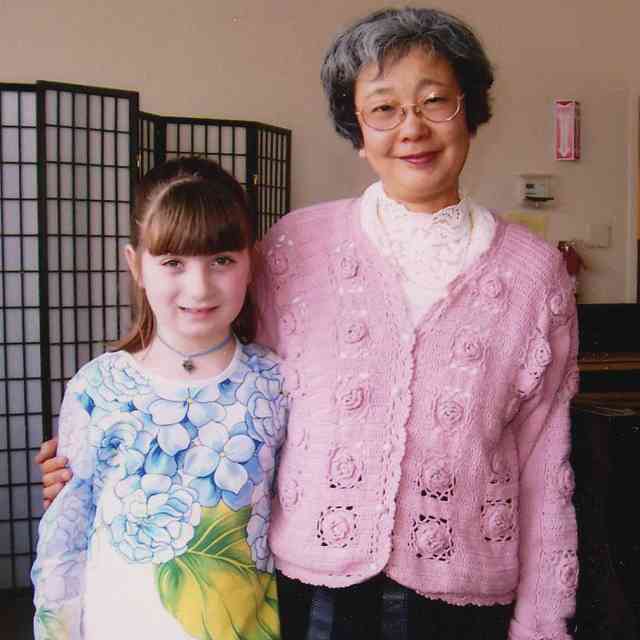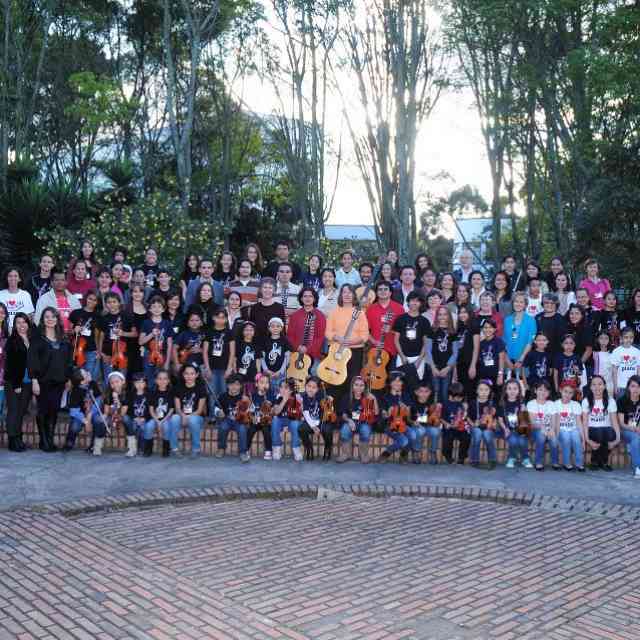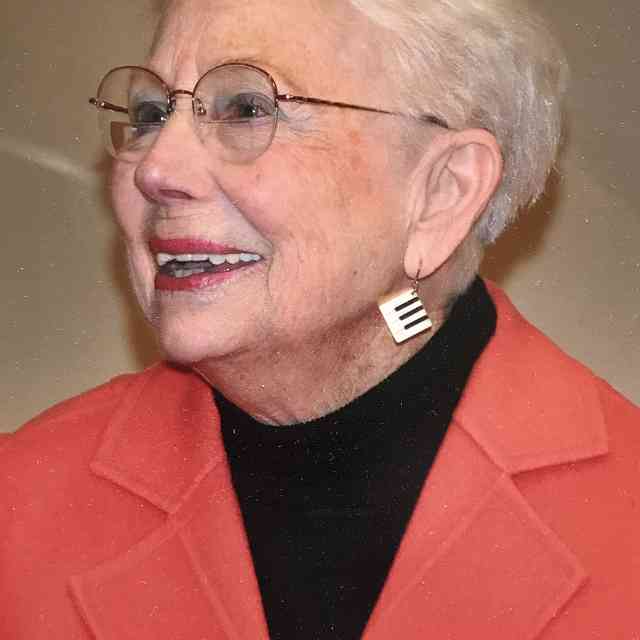
Doris and Caroline in 2011
Doris died peacefully on September 11, 2011, accompanied by her sons, while I was on my way to Guanajuato, México, for their VI Festival Suzuki.
Etna Diemecke and I dedicated the Festival to the celebration of Doris’ life. Her life inspired us to work with yet more dedication, more energy and more persistence towards the fulfillment of Dr Suzuki’s dream: a world without violence and conflicts, a world of love, peace and compassion.
I am so fortunate to have had Doris as my close friend and mentor for more than thirty years. Doris constantly encouraged me to be more than I ever imagined I could be. We first taught together at Holy Names University in California and over the years became “soul mates,” frequently team teaching, sharing master classes and sitting in on each others’ courses.
Doris lived the Suzuki philosophy: she firmly believed in all children, had a profound respect for everyone, maintained a positive outlook, and was a student herself right up to the end of her life. During a presentation on the Twinkle variations at the May 2011 Leadership Retreat in Dallas, I noticed that Doris was taking notes! Doris led by example: in January every year Doris eagerly came to the Peru International Festival to train teachers. She graciously performed during the Teachers’ Concerts and was always excited about the new enrichment course she would teach.
Doris quietly and gently nurtured the teachers in Latin America by believing in their potential and by taking a personal interest in their development. When giving feedback on the participants’ teaching, Doris was always kind and constructive. In the last years of life her main professional focus was to encourage well prepared young teachers to become teacher trainers and guide them in the process. The Latin American teachers thank Doris for her caring and generous spirit. Doris has touched the lives of so many and has left the world a better place.
In May 2011, I interviewed Doris for the Peruvian Suzuki Journal Ensamble. Although Doris was already weak and tired, she spoke with enthusiasm about Peru, about her young students and about teaching Book One!
Interview with Doris Koppelman, Dallas, Texas, May 2011
How did you imagine Peru before coming for the first time?
I imagined it was a very dangerous place because the State Department had told me not to come. There were police in the airport. I was feeling very heroic and very eager to find out what it was like. I really wanted to come.
How would you define Peru?
I can’t speak for Peru as I have only been in limited areas of the country. What I have seen is that it has been a place of tremendous enthusiasm and cheerfulness. I am always happy to be there.
Why did you always come to Peru despite the problems?
The work is so exciting and so deeply appreciated… everything was appreciated. I never felt so appreciated anywhere… and wonderful, amazing things happened.
What can you say about the Peru Festivals?
Festivals were happy times. People were so glad to have the opportunity to take the courses and participate. There was tremendous enthusiasm about participating with music of different regions and many friendships were created and strengthened.
How do you feel being a teacher trainer in front of the Peruvian teachers?
I am honored to be in that position, of being chosen to come, and I wait eagerly for them to take my place.
What do you think about the Peruvian children?
I am not sure that I am aware of being in front of Peruvian children as opposed to any other, aside from the language. However, I will say one thing. I know the great heritage of dancing amongst Peruvian people. Children learn to dance at an early age. All this requires flexibility and great freedom of movement. This should make it easier to transfer this ease to the piano.
Is there a particular anecdote you would like to share?
On my first trip I remember a teenage student from Cusco playing Musette from Book One, and playing very well. My suggestions were all suggestions on musicality. The next day she returned and had taken in all my suggestions, playing beautifully. I said it must be hard to find a piano to practice on. She said she didn’t have a piano just a cardboard keyboard. A cardboard keyboard? I never failed to be impressed by musicality on cardboard.
What attracted you to the Suzuki Method?
The thought that all children could be fantastic students: every single child in the world. I used to think, “Oh, that teacher is lucky, she gets talented students.” Then I started to look at children in the street and thought, “They all can be great… this one, that one. All can be treasures.”
How many years have you taught the Suzuki Method?
Fifty years.
How has the Suzuki Method changed over the years?
I think it has changed from looking for the rules that would make it work to experiencing the many ways of solving individual situations.
What have you learned from your experiences in Peru?
Where love is deep much can be accomplished. These are words of Suzuki.
I used to say you can’t start to learn if you don’t own a piano. Mrs. Kataoka used to say you need to get the finest instrument, and now, there is a program in the jungle where there are no CD players… and even this does not stop us. It is an unstoppable force.
What was your funniest moment?
I just remember laughing a lot.
Most moving?
So many… My most moving moment was hearing Claudio (Armas) playing the Chopin Prelude in e minor. I asked him to play a few years later, and he played it just as beautifully. It was the rubato playing that comes from deep within the person. That is a piece… one of the most touching pieces ever written.
How did you enjoy the food?
The indigenous food is delicious. I know that Peru has more variety than any country in the world. I would like to sample more of the fruits and vegetables.
And Pisco sour?
Of course, this is included amongst the amazing food in Perú.
Are you still working with Book One students? Are you finding new ways to teach it?
This year, over half my students are in Book One, and I am still trying to look for better ways to do this. I have this child from India and when she plays Twinkle, it sounds like Indian music. I am certainly doing different things. I have my end of year recital when I get home. Bianca’s brother Joshua (3) is going to walk on and take a bow. Anita will play violin with her father…
What do you think is Dr. Suzuki’s most important message?
That participating and expressing the joy of music is part of being human. All children have the birthright to experience this. That natural musicality, a natural sense of rhythm is not for a few, but is universal. I hate elitism. Music is where it is the strongest. Casals thought Dr. Suzuki’s message was beautiful.
What is your hope, vision for the Suzuki Method in the future?
My hope is to see it be made available in every country, for all children who would like to study thereby giving the children of the world many things in common and therefore lead to a peaceful world.
¡Gracias Doris por tu inspiración!
Celebremos la vida de Doris Koppelman
El 11 de setiembre Doris falleció tranquilamente mientras dormía en su casa, rodeada de sus tres hijos, mientras yo viajaba a Guanajuato, México al VI Festival Suzuki de allí. Etna Diemecke y yo dedicamos el Festival a la vida de Doris. Su vida nos inspiró a continuar con más energía, más persistencia y más dedicación hacia la realización del sueño de Shinichi Suzuki: un mundo sin violencia, sin conflictos; un mundo lleno de amor, música y compasión.
Personalmente, tengo la suerte de haber tenido a Doris como gran amiga y como mentora de mi labor Suzuki durante más de 30 años. Doris constantemente me animaba a ser más de lo que yo jamás imaginé que podría ser. Empezamos a enseñar juntas en Holy Names University en California, y a través de los años nos convertimos en “almas gemelas”: enseñando en equipo, compartiendo clases magistrales y participando en los cursos de una y otra.
Doris personificaba la filosofía Suzuki: creía firmemente en todos los niños, tenía un profundo respeto por todas las personas, mantenía siempre una actitud positiva, y continúo aprendiendo hasta el final de sus días: la vi tomando apuntes en una Conferencia en Dallas, el mes de mayo pasado, durante una presentación sobre cómo enseñar las variaciones de Estrellita! Doris nos guiaba con su ejemplo: cada año feliz y animada venia a Perú con un nuevo curso planeado y en cada festival de América Latina aprovechaba la oportunidad de los conciertos de profesores para tocar en público.
Con ternura y gentileza Doris ha guiado a los profesores Latinoamericanos teniendo fe en su potencial y tomando un interés muy personal en su desarrollo. Cuando les daba retroalimentación siempre usaba palabras amables y constructivas. Durante los últimos años de su vida el enfoque de su labor profesional fue el animar y guiar a profesores jóvenes con buena preparación para ser profesores de capacitación. Los profesores de América Latina le están eternamente agradecidos por la entrega que siempre tuvo con ellos y por su espíritu generoso. Definitivamente Doris ha tocado la vida de miles de personas y nos ha dejado un mundo mejor.
En mayo 2011, yo le hice una entrevista para la revista de la Asociación Suzuki del Perú Ensamble. A pesar de sentirse ya débil y cansada, ella habló con mucho entusiasmo sobre sus experiencias en Perú, sobre sus alumnos pequeños y sobre cómo enseñar libro 1.
ENTREVISTA con Doris, en la Conferencia SAA en Texas, mayo 2011
¿Cómo te imaginabas el Perú antes de venir por primera vez?
Me lo imagine como un lugar muy peligroso porque el Departamento de Estado me había dicho que no vaya. Había policías en el aeropuerto. Me sentí muy heroica y con muchos deseos de saber cómo era. Realmente quería venir.
¿Cómo definirías el Perú?
No puedo hablar sobre el Perú dado que he estado en delimitadas áreas del país. Lo que he visto es que ha sido un lugar con tremendo entusiasmo y jovialidad. Siempre estoy feliz de estar ahí.
¿Por qué viniste siempre al Perú a pesar de tantos inconvenientes?
El trabajo es tan emocionante y tan profundamente valorado…. Todo era apreciado. Yo nunca me sentí tan apreciada en ninguna parte…… y maravilloso, cosas asombrosas sucedieron.
¿Qué puedes decir de los festivales de Perú?
Los Festivales fueron siempre momentos felices. La gente estaba tan contenta de tener la oportunidad de tomar cursos y participar en ellos. Había un tremendo entusiasmo por tocar la música de diferentes regiones y muchas amistades se crearon y se fortalecieron.
¿Cómo te sientes como teacher trainer frente a los maestros peruanos?
Me siento honrada de estar en esa posición, de haber sido elegida para venir, y los espero ansiosamente a que tomen mi lugar.
¿Que piensas de los niños peruanos, qué características tienen?
No estoy segura de estar consciente de estar al frente de los niños peruanos a diferencia de cualquier otro, a parte del lenguaje. Sin embargo, voy a decir una cosa. Yo conozco la gran herencia del baile entre el pueblo peruano. Los niños aprenden a bailar a edades tempranas. Todo esto requiere flexibilidad y una gran libertad de movimiento. Esto debería contribuir en hacer más fácil transferir ese gusto al piano.
¿Alguna anécdota o recuerdo que quieras contarnos?
En mi primer viaje recuerdo a una alumna adolescente del Cuzco tocando Musette del Libro 1, y tocándolo muy bien. Mis sugerencias fueron todas sugerencias sobre musicalidad. Al siguiente día ella regresó y tomó todas mis sugerencias, tocando preciosamente. Le dije que debió ser difícil encontrar un piano para practicar. Ella me respondió diciendo que no tenía un piano sino un teclado de cartulina Un teclado de cartulina? Nunca antes me impresioné tanto por la maestría musical en una cartulina.
¿Qué es lo que te atrajo al Método Suzuki?
El pensar que todos los niños pueden ser fantásticos estudiantes: cada niño en el mundo. Acostumbraba a pensar….oh ella es afortunada, ella consigue estudiantes talentosos. Entonces yo empecé a mirar a los niños por la calle y pensé “Todos ellos pueden ser grandiosos…. este, aquel. Todos pueden ser tesoros”!
¿Cuántos años has enseñado Método Suzuki?
Cincuenta años.
¿Cómo es que ha cambiado el Método Suzuki a través de los años?
Creo que ha dejado de basarse tanto en las reglas que lo harían funcionar y a cambio esta buscando maneras de solucionar o trabajar con situaciones individuales.
¿Qué es lo que has aprendido de tu experiencia en Perú?
Donde hay mucho amor muchas cosas pueden ser logradas. Estas son palabras de Suzuki. Acostumbraba a decir que no puedes empezar a aprender si no tienes un piano. Mrs Kataoka acostumbraba a decir que se necesita conseguir el más fino instrumento, y ahora, hay un programa en la selva donde no hay ni siquiera lectores de CD….. y aún así esto no nos detiene. Es una fuerza imparable.
¿Cuál fue tu momento más gracioso?
Sólo recuerdo haberme reído un montón
El momento más conmovedor?
Tantos…. Mi momento más conmovedor fue escuchar a Claudio tocar el Preludio de Chopin en Mi menor. Le pedí tocarlo algunos años más adelante, y él lo tocó tan maravillosamente. Fue la interpretación del rubato que proviene desde lo más profundo y dentro de la persona. Esa es una pieza… una de las más enternecedoras piezas jamás escritas.
¿Disfrutó la comida?
La comida autóctona es deliciosa. Sé que Perú tiene mayor variedad que cualquier otro país en el mundo. Me gustaría probar más frutas y verduras locales.
Y el Pisco Sour?
Claro, está incluido entre la asombrosa comida del Perú!
¿Todavía sigues trabajando con el Libro 1 para estudiantes? ¿Estas encontrando nuevas formas de enseñarlo?
Este año, más de la mitad de mis alumnos están en libro 1, y yo estoy todavía tratando de buscar mejores modos de enseñarlo. Tengo a una niña de la India y cuando ella toca Twinkle, suena como música de la India. De seguro estoy haciendo cosas distintas. Tendré mi recital de fin de año cuando llegue a casa. Joshua (3) el hermano de Bianca saldrá al escenario y hará su gran saludo. Anita tocará violín con su padre….
¿Cuál crees que sea el más importante mensaje del Dr. Suzuki?
Doris: Que el participar y expresar la alegría de la música es parte de los seres humanos. Todos los niños tienen el derecho por nacimiento de experimentar esto. Aquella maestría musical natural, un sentido natural del ritmo no es solo para unos cuantos, sino que es universal. Odio el elitismo. La música está donde está lo más fuerte. Casals pensó que el mensaje del Doctor Suzuki era hermoso.
¿Cuál es tu esperanza y visión futura para el Método Suzuki?
Doris: Mi esperanza es verlo cada vez más accesible en todos los países del mundo, para todos los niños que deseen estudiarlo, brindándoles así muchas cosas en común y por lo tanto, conducirlos a un mundo de paz.
Traducido por Gisela Vidal, Caroline Fraser, Perú; Cecilia Calvelo, EE.UU.









